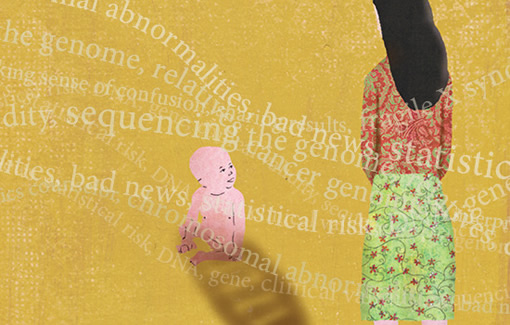More than 1,600 genetic tests are now available commercially. Consumer-oriented genomics companies offer a person scans of more than a million points in the genome with just one "spit in a cup." In a few years, next-generation sequencing technology is expected to push the price of reading all 3 billion base pairs of someone's entire genome to below $1,000. By the time today's first-year students enter medical practice, what's now considered routine is bound to change even more.
For years, medical students typically have learned about genetics in a semester-long course that runs through a catalog of genetic disorders. But recently, Emory and other medical schools have changed how young doctors approach genetics lessons by emphasizing the ethics behind genetics. That approach in turn is influencing treatment and diagnosis in many fields, from oncology to neurology to cardiology.
"We want to underline how genetics is becoming integrated into many parts of medicine," says Kathryn Garber, director of education for Emory's Department of Human Genetics. "After all, everyone has DNA that somehow affects their health, not only people with rare disorders."
Basic principles
Emory's medical school offers a two-week genetics module for first-year students, which emphasizes a number of principles: among them, how to approach testing and diagnosis and how to talk with patients about difficult topics.
"It all comes back to basics," Bellcross says. "We have to give people the framework and the tools so that they'll be able to evaluate the latest test."
She describes the concepts of clinical validity (a test's consistency and accuracy in predicting whether a patient will develop a particular disease) and clinical utility (whether that prediction can improve someone's life). Doctors need to learn not only how to gauge a test's validity and utility but also be able to distinguish between them, she says.
The results of a test for a gene that causes an incurable neurodegenerative disorder may leave the patient with little to do besides dread the future. On the other end of the spectrum, other tests have limited, practical consequences. They might predict, for example, how well someone will respond to a specific blood pressure medication.
"I think it's good to focus on these genetic questions now because the principles will still be the same later," says medical student Ken Buchanan. "During the module, I kept thinking, if you do all the tests, when does it really change what you would do for the patient."
One message that Bellcross especially wants students to learn is knowing their own limits. Navigating the complexity of genetic tests can be easier by using a team approach, she says, with genetic counselors and specialists collaborating.
The hard part: interpretation
Geneticists at Emory recently sequenced a patient's entire genome in an effort to determine whether her children could inherit the kidney disease that she had. Mike Rossi, director of Emory's cancer genomics shared resource facility, and his team found that anomalies in the patient's standard DNA — which they thought were causing disease — were present also in the patient's healthy relatives.
"Obtaining vast amounts of information is the relatively easy part," Rossi says. "The hard part is interpreting it."
In a recent Emory class, genetics counselors Dan Wiesman and Dawn Laney engaged in a mock interview to get that very point across to 140 first-year students. Laney played the role of a woman who was planning a family and might be a carrier for a developmental disorder such as fragile X syndrome. In her role, she described her brother and her uncle as "slow." Her grandfather had "the shakes," but she didn't know much about her fiancé's family history.
The exercise illustrates a scenario that the students will may face one day. Their future patients won't necessarily know their complete medical histories or their relevant genetic information. Therefore, these students will need to be able to explain technical issues in ways that patients will understand. They also will need to recognize that knowledge gained from a genetic test will affect the entire family, not just the person being tested.

